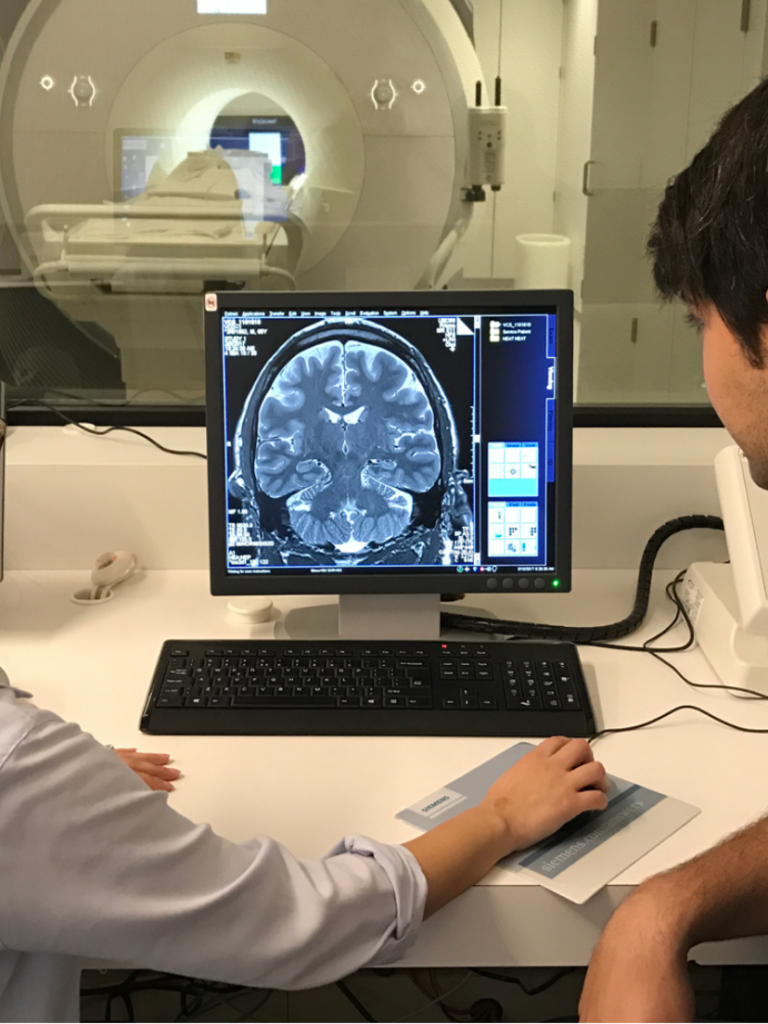The Cognitive Science Major
The core courses and electives sample from courses in computer science, human biology, linguistics, mathematics, philosophy and psychology. The major consists of four fixed core courses, plus two tiers of flexible core courses.
The first tier generally consists of more introductory courses and the second tier of more advanced courses. Students must take two courses from the first tier and three courses from the second. One goal of the flexible tier system is to structurally implement interdisciplinary breadth with some degree of flexibility.
The flexible core is a subset of the electives, from which students can choose in order to complete the required number of units. Students may elect to focus their curriculum around one or more tracks, which are suggested courses of study for focusing on a particular topic or topics in cognitive science.

Learning Objectives
- Students will acquire significant expertise in at least two core areas within the cognitive sciences. Examples include cognitive psychology and linguistics, linguistics and computation, cognition and computation, and so on. Students will obtain the same level of mastery of sub areas within those disciplines as a student majoring in one of the core disciplines. For example a cognitive science major focusing on linguistics and neuroscience will gain comparable mastery of syntactic theory as a linguistics major, and comparable mastery of cognitive neuroscience as a neuroscience major.
- Students will acquire a basic understanding of a third core area within the cognitive sciences, such as might be covered in intermediate level courses.
- Students will learn to synthesize knowledge and methods of investigation from several traditional disciplines, giving them the ability to think about cognitive phenomena from multiple perspectives. That is, students will acquire skills in specific areas within the cognitive sciences, such as cognitive neuroscience and linguistics, and they will also develop a cohesive understanding of how the sub areas are related, and how they mutually inform each other. These skills will provide students with a flexible and creative approach to problem solving in general, beyond the cognitive sciences.
- Students will learn how to present the results of scientific research in oral and in written forms, following the conventions of the relevant sub areas of cognitive science. Students will develop the skills necessary to produce and communicate scientific arguments, and to discuss theories and concepts in cognitive science in clear and accessible ways.
Suggested Tracks
The suggested tracks are organized by broad areas of emphasis within three broad areas within cognitive science, and more specific areas of interest within the broader domains. These tracks are suggestions only; they are not listed on the transcript, and they do not have to be officially declared. Students can work with their academic adviser to tailor an interdisciplinary curriculum that combines several areas.
Cognitive Science Honors
The cognitive science major with honors requires the student to complete the requirements for the major with a GPA of 3.5 or above and to complete in addition CGSC 498 Honors Thesis with a grade of B or better. Intent to complete the cognitive science major with honors should be registered with the undergraduate adviser no later than the second semester of the junior year.
CGSC 490x: Directed Research
CGSC 490x allows students to conduct research under faculty direction. The course is open to juniors and seniors majoring in Cognitive Science. Students may enroll in 2 – 4 credits in one semester, continuing over multiple semesters, up to a maximum of 8 credits.
Career Opportunities
The Bachelor of Arts in Cognitive Science provides a foundation of skills and knowledge that is both broad and deep. Graduates will be well prepared for fields that require creative problem solving, quantitative analysis, and scientific thinking. The degree will also be excellent preparation for students who pursue an advanced professional degree, such as in law or medicine, as well as for graduate school in the cognitive sciences or related academic disciplines.